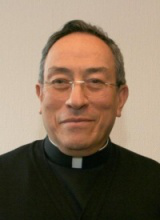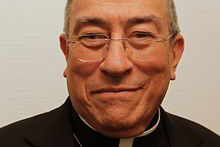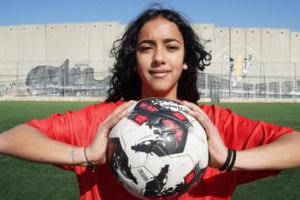Text: Archbishop Óscar Maradiaga at Washington DC Migration Conference

Archbishop Óscar Rodríguez Maradiaga
His Eminence Óscar Andrés Rodríguez Maradiaga, Archbishop of Tegucigalpa and President of Caritas Internationalis gave the following keynote address at the National Migration Conference in Washington DC on 7 July 2014.
July 7, 2014
Thank you for the introduction and the warm welcome and thank you for this wonderful invitation to talk about something which affects us all – migration.
I am pleased to be here at your National Migration Conference, which happens only once every several years. It is an important event in the life of the Church in this country, and I hope I can set the right tone for your gathering.
Who’s been watching the World Cup? I’m going to share with you something that may surprise you now – it really surprised me when I read it – two-thirds of players in this World Cup are immigrants.
Isn’t that incredible? Not just for the number of immigrants playing, but that finally – finally – there’s a positive story about immigration in the press.
Let me first offer a foundation for our work, one based upon the truth of the Gospel.
Christ Himself and the Holy Family were refugees, as they fled to Egypt to escape the terror of Herod. As an adult, Jesus is an itinerant preacher who travels through Galilee and Judea to spread his message: “Foxes have holes, and birds of the air have nests, but the Son of Man has nowhere to lay His Head.” (Mt 8-20) As the Lord came to share his humanity with us in everything but sin, so, too, he came to share our experiences and challenges, including the migrant experience.
Christ lived as a migrant and refugee in order to live with his people in solidarity, to provide example for all generations, and to teach us to follow His example. This is clear in the Gospel of Matthew, where the Lord teaches us that to attain the Kingdom of Heaven, we must welcome the stranger: “For I was hungry and you gave me food, I was thirsty and you gave me drink, I was a stranger and you welcomed me.” (Mt. 25-25) “Just as you did this to the least of these who are members of our family, you did it to me.” (Mt. 25-39, 40)
How do we, as a Catholic community, respond to the truth of Christ the migrant and the call of our Lord to welcome the stranger? We manifest this truth and respond to His call in all aspects of our ministry—pastoral care, social services, education, and advocacy---and accomplish it by the participation of all in the Catholic community---clergy, religious, and the laity. As a global institution, this obligation transcends national boundaries and national interests, and thus places the Church as a defender of immigrants and refugees around the world.
In the western hemisphere, the Church’s role as defender of migrants and refugees is more important than ever, as those on the move continue to be subject to abuse, exploitation, and violence. Recently, we have seen disturbing migration trends which cause grave concern and call for corrective action, as migrants—even children---are becoming victims of drug smugglers and cartels, human trafficking rings, corrupt enforcement officials, and increasing gang violence.
The statistics are alarming. What we are finding is that, as economic migration in our hemisphere has slowed somewhat, migration fleeing violence and persecution is on the increase, particularly from Central America to the United States. Migrants from Central America, which has a significantly higher murder rate than Mexico, are considerably more likely to migrate because of violence (about 13 percent) than migrants from Mexico (4.3 percent). The murder rate in Central America, specifically my own country of Honduras and El Salvador, has increased by 50 percent over the past ten years, particularly from gang violence.
There are children here in the USA who are locked away in cells because they cross the border from Mexico without documents.
Our colleagues from Catholic Charities in Arizona report that this children – along with pregnant women- sometimes sleep on concrete floors. Those over six years old are separated from their parents. If any of these young people turn 18 while in custody, they are handcuffed on the morning of their birthday and deported back home.
Can you imagine if you start your adult life being treated as a criminal ? Where do you go from there? Probably not down the path which lead you to fulfilling your dreams and aspirations.
Many of these children are from my own country, Honduras. They flee gangs who want to induct them into a life where they will surely die a violent death at a young age.
It is like someone has torn open an artery in Honduras and other Central American countries. Fear, grinding poverty and no future mean we are losing our lifeblood – our young people. If this continues to happen the hearts of our nations will stop beating.
But what can their parents do apart from send them away to save their lives? The children and young people of these countries need to escape the violence in the hope of finding a safe place, an education, a home, a job – even though on the migrant journey they risk violence and abuse, being trafficked and sometimes death.
And what are WE doing to help these migrants? While the Italian navy is dredging up bodies from the Mediterranean and thousands are dying in the sands of the desert between Mexico and the US and in the Sahara, many people are burying their heads in the sand.
This is the very thing Pope Francis warned us about: “the globalisation of indifference”.
Migration is here to stay. There will always be people who seek to enter wealthier and more stable countries to find safety, hope and opportunities. While there is inequality, poverty and suffering in many nations people will have no option but to leave if they want themselves and their families to prosper. It is a question of human rights but also, quite simply of humanity.
While the migrants’ path is full of twists and turns and uncertainty, our path as Christians is very clear: “Each individual Christian and every community is called to be an instrument of God for the liberation and promotion of the poor, and for enabling them to be fully a part of society.” This is what Pope Francis invites us to do in his Apostolic Exhortation, Evangelii Gaudium.
But how do we do this as individuals, as families, as organizations and as nations?
As you may know, I’m the president of Caritas Internationalis – a confederation of 164 national Catholic organizations which work on human development and the promotion of justice and dignity across the globe.
In the US our member organizations are Catholic Charities USA and Catholic Relief Services. They, along with the United States Catholic Bishops’ Conference - and specifically Migration and Refugee Services - do a magnificent job in helping migrants materially, psychologically and spiritually within and beyond US borders and. As the President of Caritas Internationalis, I would like to extend my appreciation to all the Catholic agencies in the United States who assist refugees both overseas and in this country. The work of Jesuit Refugee Services and Catholic Relief Services with refugees overseas is exemplary and provides hope to them in their hour of need. The work of Migration and Refugee Services of USCCB, along with the vast resettlement network of Catholic Charities agencies throughout the United States, gives thousands of refugees each year a new life, a new beginning, in safety and with opportunity. Your work is good news to all around the world.
This is a great example of how to work together across organizations.
As Caritas we work with migrants before they leave their country, during their journey, when they arrive at their destination and if they decided to return home. In Spanish, we call what Caritas does “acompañamiento”. In English, that means we are there for them when they need us. Like Jesus walking with the disciples on the road to Emmaus we walk side by side with people in their moments of doubt and suffering.
For any person of faith, there is no clearer message of how we should respond to migrants than the story of the Good Samaritan. Welcome the stranger. Feed him, bathe his wounds and take care of him. Welcome the one who is different to you.
When I hear the stories of migrants who undertake journeys of thousands of miles I marvel at their courage and determination. The Archbishop of Rabat told Caritas recently that migrants come to him for a blessing and before they try to climb the fence between Morocco and the Spanish enclave of Melilla. He says some of them are trying for the 10th time!
Despite their enormous courage, these people are sometimes also very frightened and traumatised by what they go through. However, when I look at how the international community is reacting to the migration crisis, I wonder who’s the most afraid: the migrants or the countries where they’re heading?!
Nations build fences and walls and detention centres to keep migrants out or in a secure place. Migrants are imprisoned, neglected, expelled and every obstacle possible is put in the way of them improving their lives. Can you imagine if St Paul tried to get into Europe nowadays? Rather than being welcomed with “unusual kindness” he would probably be classed as an undocumented migrant and sent back home.
Caritas is inspired by the words of Pope Francis to the World Migrants Day 2014: “The reality of migration, needs to be approached and managed in a new, equitable and effective manner; more than anything, this calls for international cooperation and a spirit of profound solidarity and compassion. Cooperation at different levels is critical, including the broad adoption of policies and rules aimed at protecting and promoting the human person”.
One such norm is the Convention on the Rights of the Child – which celebrates its 25th anniversary this November. Can we work to ensure our governments ratify this convention? The United States was active in drafting the convention and has signed it. Could we invite the US to take the final step to ratify this convention? That would be a great birthday present for the convention and the children whose rights it ensures.
If we were to make a list on behalf of the children who cross borders, the end of putting children in cells as though they were criminals would have to be at the top. Can the community of states agree that they will not put young migrants in detention? It is an urgent matter of rights and civilization.
As a Salesian, I have a particular interest in the development of the young. The guaranteeing of the rights of migrant children is just the first step. But we must also work to ensure the development of the whole person with education, training and spiritual growth.
Now that the Millennium Development Goals are expiring, we need to think long and hard about how global development will evolve over the next 15 years. Migration is part of the foundations of human development. Migrants bring skills and manpower to their destination nations. They are a resource. They send money home to help their families, thus boosting the economy of home nations.
Migration needs to be on the post-2015 agenda because it is linked to many other aspects of development such as food, health, climate change and justice. I encourage the global community to ensure education and opportunities for young people so they can choose to stay in their home countries. When people do migrate, it should be a legal and safe option.
How can we be really united as one human family unless everyone is welcomed into our fold? My friend Cardinal O’Malley went to the Mexican border recently to celebrate mass. The image of him giving communion to migrants through the fence between Mexico and US is a powerful symbol of the brokenness of our family.
Another troubling issue of migration is human trafficking. It is hard to imagine that as many as 700,000 persons each year are subject to this modern form of slavery. As you know, the Church has been in the forefront of fighting this scourge, and Pope Francis has made it a priority for Catholics around the world. On April 10, at a conference on human trafficking at the Vatican, the Holy Father said “enough” to human trafficking, calling it a “crime against humanity”: “Human trafficking is an open wound on the body of contemporary society, a scourge upon the body of Christ. It is a crime against humanity.”
The Holy Father’s comments add urgency to this issue. We must continue to work for legislation against this plague, serve its victims, and educate Catholics and others about its grim realities. I congratulate the work of the U.S. Catholic bishops and the Catholic Coalition Against Human Trafficking for their work on this issue.
The Holy Father, Pope Francis, pointed this out at Lampedusa, his first trip outside the Vatican, where he cited the “globalization of indifference” toward the migrant and refugee and decried our “throwaway culture.” In many ways, the Holy Father has demonstrated the Church’s love of the migrant through simple acts—throwing a wreath in the Mediterranean on behalf of victims or sending 2,000 Christmas gifts to an immigrant shelter in Rome, which are a powerful witness to the Church’s ministry to persons on the move. I was heartened to see the U.S. Bishops’ Committee on Migration, led by Cardinal Sean O’Malley, travel to the U.S.-Mexico border to remember those who have died there, just as Francis did at Lampedusa.
Pope Paul VI wrote in Populorum Progressio, "Man must meet man, nation must meet nation, as brothers and sisters, as children of God. In this mutual understanding and friendship, in this sacred communion, we must also begin to work together to build the common future of the human race."
The walls and fences will never be high enough nor strong enough to keep millions of migrants from their destinies because they have courage, strength and determination on their side.
We shouldn't be building walls and fences, we should be building bridges! Bridges to help developing nations grow in a way so that their people don’t leave. Bridges to the people who decide they have no choice but to seek a future elsewhere. As that greatest bridge builder - the Pontifex Maximus - Pope Francis says:
“With due respect for the autonomy and culture of every nation, we must never forget that the planet belongs to all mankind and is meant for all mankind; the mere fact that some people are born in places with fewer resources or less development does not justify the fact that they are living with less dignity. (EG 190).
No one person or government has all the answers. We are just poor people on a pilgrimage – like the migrants. We – individuals, the Church, nations – must remember to see the face of Jesus in the migrant knocking at our door and queuing at our borders. We must not lose faith.
To quote one of the United States’ most famous sons and one of its most fervent proponents of human rights, Martin Luther King: “With this faith we will be able to transform the jangling discords of our nation into a beautiful symphony of brotherhood.” (MLK)
Everyone has dreams. We’re here at this conference in the land of the “American dream”; the land of ‘life, liberty and the pursuit of happiness’.
The children and adults who take their lives in their hands and migrate need a chance that their dreams will come true. And who knows, among these children seeking refuge in America now, there could be a future Albert Einstein or Madeleine Albright or even a future Pope.
You, here in this room, carry that message of love every day in the work you do. Your service to and advocacy on behalf of migrants, refugees, trafficking victims, and children provides the glimmer of hope that these vulnerable populations need. You make a difference in people’s lives, although you may not always see it. I urge you to continue to work on their behalf and to serve the mission of the Church in this area.
If you are new to this mission, I pray that this conference will inspire you to get involved, whether it be on a service, advocacy, or pastoral level. As we offer these works of solidarity, however small, the Lord Jesus sees them and sends the Holy Spirit to help us, so that our work helps unify all of His people.
In the end, by opening the door to the stranger, we are opening the door to Christ in our lives.
The Lord is the one who says in the Book of Revelation: “Behold, I stand at the door and knock. If anyone hears my voice and opens the door, then I will enter his house and dine with him, and he with me” (Rev. 3:20).
God bless you.
















